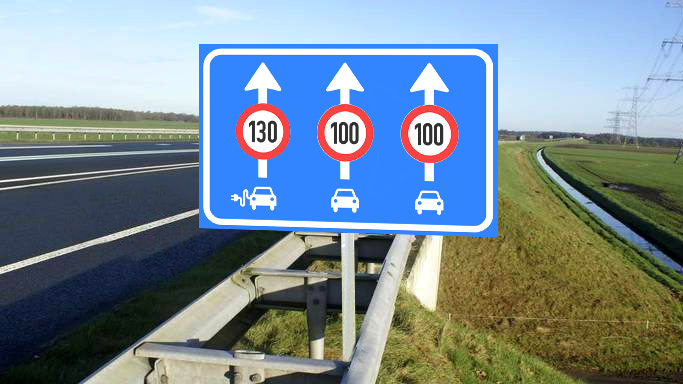In response to the nitrogen crisis, the Dutch cabinet is planning to reduce the speed limit during the day to 100 kph. In itself a sensible decision. But it is strange that this measure also affects motorists who cause no nitrogen emissions whatsoever. A missed opportunity to reward sustainable actions. That's why we started a petition. We want a separate lane for electric cars where 130 km/h is allowed. Sign if you agree with us.
Before I explain why we should keep the speed limit at 130 kph for drivers of electric cars, a confession: I don’t own an electric car myself.
I pretty much always take the train. It’s a comfortable option and you can spend the journey reading or working. I do still own (blush) an old-fashioned gas-powered car. I’ve had it for six years, and I still regret not opting for an electric car at the time. You know the arguments: too expensive, too small a radius of action, the car I liked only came in a gas variant. The consumer in me defeated the citizen. So it often goes.
As citizens we have high-minded ideas about a better society. Then we walk into a shop and buy things totally at odds with our ideals. Unfortunately, I’m all too familiar with this particular human flaw.
What the government can do
This is where the government can give the citizen a push in the right direction. How? By inviting the consumer to behave in a way that contributes to a better society. This is already happening. When I want to park my gas car, there’s never a convenient spot besides the charging stations reserved for electric cars.
Good for them, I think. These people have made a more sustainable choice than I have, and they should be rewarded. If I’m soon to be sped past at 130 kph, I can feel bitter towards the rich showoffs in the fast lane. Or I can bear in mind that these investors in the energy transition have earned their fun.
A positive step in the energy transition
When a new technology is introduced, it’s always more expensive than the existing options at first. The first flat-screen televisions were only affordable for millionaires, because the investments made into new factories had to be earned back.
That lasts a few years, and then the price falls and the product becomes affordable for everyone. I see rich people prefer a Tesla to a Ferrari. Let’s encourage that. Besides, a fully electric second-hand Nissan Leaf costs €8500. I could afford that, and when I look around me on the highway, I suspect that plenty of other motorists could too.
Granted, electric cars are not perfect. Wear and tear on the tires still produces fine dust. Driving fast consumes more energy. If that energy is supplied by coal-fired power stations, CO2 emissions are still involved. And that’s without going into the conditions in the lithium mines—plus the energy costs of producing the batteries. You could lose hope thinking about it all. Staying in bed is more sustainable.
But the question remains: is the glass half empty or half full?
Answer: half full.
Electric cars are a positive step in the energy transition, which must be encouraged. Elsewhere that’s already happening. In Austria, electric cars adhere to a speed limit of 130 kph, while 100 kph is the norm for others. In Norway, electric cars can drive in bus lanes. Even Uber encourages its drivers to go electric. Why wouldn’t the Dutch government do the same? Maybe it’s something to do with our Calvinist mentality?
Sustainability should be rewarded
Sustainability is often equated with cutting down, austerity, stringency. That is an error. We think about it one-sidedly, in terms of crime and punishment, when we should be thinking in terms of possibilities, smart solutions and circularity.
There is an unbelievable amount of energy available on Earth, and right now we only harvest and utilize a tiny proportion of it. How absurd is it that humanity continues to generate most of its energy from the burning of coal, which releases CO2 that contributes to climate change, while a gigantic power plant floats in space at a safe distance?
I hope that future generations can laugh about it and do better.
The sun is a nuclear fusion reactor with an output of 380 million million million million watts. That’s equal to 10 million oil barrels per second, per world citizen. Even though only a small proportion of this energy reaches the Earth, this proportion is still 9000 times the current energy requirements of all 7.7 billion people on Earth combined.
If we’re smart enough to put more of the available energy to work for us in a sustainable way, a bright beautiful world full of abundance awaits us. That costs time, that costs money, we’re still a long way off, and the journey will be full of ups and downs. The nitrogen crisis is not called a crisis for nothing. Policy has to be made at lightning speed. That policy can be refined by rewarding positive sustainable actions.
There are plenty of places where this can be done safely. Think of five-lane highways. In the right-hand lane, a diesel-powered truck chugs along at 80 kph. In the middle three lanes, gas-powered cars go 100 kph. In the left-hand lane, an electric car zooms into the future at 130 kph.

xhyvxjcygm
Muchas gracias. ?Como puedo iniciar sesion?
Muchas gracias. ?Como puedo iniciar sesion?
Posted on